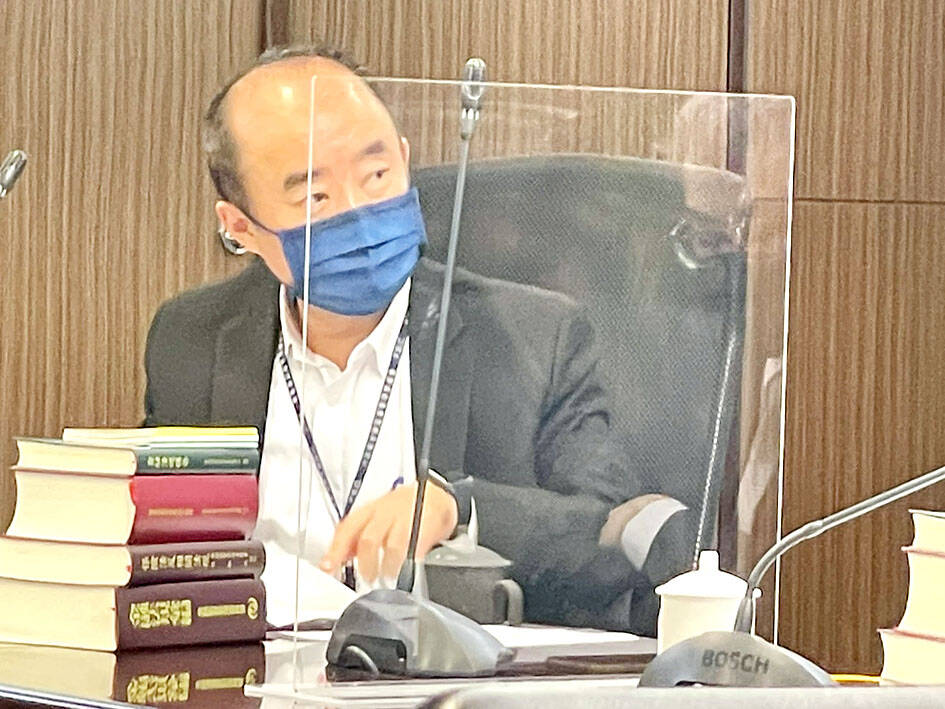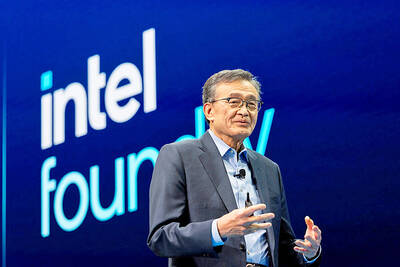Local life insurers would be allowed to reclassify their financial assets under the International Financial Reporting Standards 9 (IFRS 9) to reflect the effects of rate hikes on their liabilities, the Financial Supervisory Commission (FSC) said yesterday.
The move is also expected to help insurers mitigate the effects on their financial gauges of aggressive rate hikes by the US Federal Reserve, especially the equity-to-asset ratio, the commission said.
The commission made the announcement after the Accounting Research and Development Foundation on Thursday approved a proposal to reclassify assets.

Photo: Kelson Wang, Taipei Times
“The FSC respects the accounting foundation’s decision and we will let insurance companies to decide themselves whether to reclassify financial assets,” Insurance Bureau Deputy Director-General Thomas Chang (張玉煇) told an online news conference. “The management and the accountants should explain explicitly the necessity of reclassification, and make announcement in advance.”
The commission would also require insurers to set up special reserves if they plan asset reclassifications to maintain a solid financial profile, Chang said.
Insurers can reclassify their financial assets from this month, the commission said.
Seven life insurers reported that their equity-to-asset gauges dropped below the 3 percent minimum as investment values plummeted amid rate hikes.
Insurers including Cathay Life Insurance Co (國泰人壽) last week said rate hikes affected their assets and liabilities, but the accounting rules only enabled them to reflect the impact on assets.
The commission yesterday also said that the tighter IFRS 17 would take effect in Taiwan in 2026, allowing time for local insurers to adjust their accounting, actuarial, investment and risk control systems.

Mercuries Life Insurance Co (三商美邦人壽) shares surged to a seven-month high this week after local media reported that E.Sun Financial Holding Co (玉山金控) had outbid CTBC Financial Holding Co (中信金控) in the financially strained insurer’s ongoing sale process. Shares of the mid-sized life insurer climbed 5.8 percent this week to NT$6.72, extending a nearly 18 percent rally over the past month, as investors bet on the likelihood of an impending takeover. The final round of bidding closed on Thursday, marking a critical step in the 32-year-old insurer’s search for a buyer after years of struggling to meet capital adequacy requirements. Local media reports

US sports leagues rushed to get in on the multi-billion US dollar bonanza of legalized betting, but the arrest of an National Basketball Association (NBA) coach and player in two sprawling US federal investigations show the potential cost of partnering with the gambling industry. Portland Trail Blazers coach Chauncey Billups, a former Detroit Pistons star and an NBA Hall of Famer, was arrested for his alleged role in rigged illegal poker games that prosecutors say were tied to Mafia crime families. Miami Heat guard Terry Rozier was charged with manipulating his play for the benefit of bettors and former NBA player and

TECHNOLOGICAL RIVALRY: The artificial intelligence chip competition among multiple players would likely intensify over the next two years, a Quanta official said Quanta Computer Inc (廣達), which makes servers and laptops on a contract basis, yesterday said its shipments of artificial intelligence (AI) servers powered by Nvidia Corp’s GB300 chips have increased steadily since last month, should surpass those of the GB200 models this quarter. The production of GB300 servers has gone much more smoothly than that of the GB200, with shipments projected to increase sharply next month, Quanta executive vice president Mike Yang (楊麒令) said on the sidelines of a technology forum in Taipei. While orders for GB200 servers gradually decrease, the production transition between the two server models has been

BETTER THAN EXPECTED: The firm’s Q3 results exceeded its projections, based on ‘the underlying strength of our core markets,’ chief financial officer Dave Zinsner said Intel Corp returned to profitability and gave an upbeat revenue forecast after PC demand grew, suggesting that it is making progress on a long and challenging comeback attempt. In the third quarter, revenue rose 3 percent to US$13.7 billion. The Santa Clara, California-based company posted its first quarterly net income since the end of 2023, with earnings per share of US$0.23, excluding some items. Analysts had estimated sales of US$13.2 billion and earnings per share of US$0.01 on average, according to data compiled by Bloomberg. Fourth-quarter sales would be roughly US$13.3 billion, the company said in a statement on Thursday. Intel shares gained about